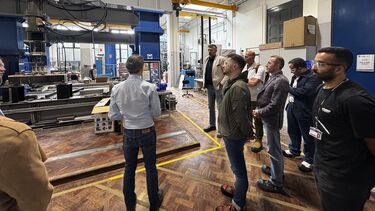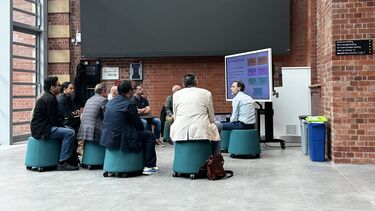Researchers from Lviv Polytechnic National University (LPNU), Ukraine, visited the University of Sheffield last month to advance a joint venture that aims to revolutionise Ukraine's post-conflict reconstruction, making its recovery faster and more environmentally sustainable.
For the past year, researchers from the UK, Ukraine and Netherlands have been collaborating remotely on the Safe, Sustainable, and Swift Reconstruction of Ukraine (S3RoU) project, to develop a safe and sustainable solution for rebuilding Ukraine. Associate Professors Taras Markiv and Oleksii Hunyak traveled to the UK where their visit began at the University of Leeds, the technical lead on the project. Proceeding to Sheffield they visited key delegates as well as the heavy structures lab where they witnessed advanced material testing and structural resilience demonstrations.
Sheffield is the administrative lead and is also leading the development of novel testing and measuring methodologies to characterise the physical, chemical, and mechanical properties of recycled concrete aggregates. This is a critical step to unlock the full potential of these materials and guarantee the performance, durability, and safety of circular concrete structures.
The collaboration is poised to significantly improve lives in Ukraine by driving three critical initiatives: advancing green technologies, promoting sustainability in construction, and implementing circular economy principles. Steps that are essential for Ukraine's immediate recovery and long-term, resilient development.
The project is scheduled to continue through to 2026, maintaining close collaboration with LPNU with the immediate next step to investigate the properties of concrete incorporating recycled concrete aggregates. Over the longer term, the focus will be on developing the project's outcomes and seeking broader collaborations to scale the impact.
Associate Professor Taras Markiv, Department of Building Production, Institute of Civil Engineering and Building Systems, said: “During our visit to the University of Sheffield, we had the opportunity to explore state-of-the-art laboratories and cutting-edge equipment. This exposure has inspired us to revise our research plan to align with new possibilities and methodologies observed during the visit.
Professor Markiv added: “Support from the UK is essential. British experts in civil and structural engineering generously shared their experience with our colleagues, and the advanced facilities at the University of Sheffield enable us to study construction materials in greater depth, leading to more accurate and impactful conclusions.”
Dr Maurizio Guadagnini, Senior Lecturer in the School of Mechanical, Aerospace and Civil Engineering, said: “Meeting our Ukrainian partners in person was invaluable. We were able to move beyond immediate project goals and strategize future collaborations. Our shared vision is to expand our efforts in circular construction to maximize our contribution to rebuilding Ukraine.”
The delegation also consisted of representatives from the University of Leeds, the funders and members from the School of Mechanical, Aerospace and Civil Engineering at the University of Sheffield. S3RoU is backed by the Innovate Ukraine programme and UK International Development.



